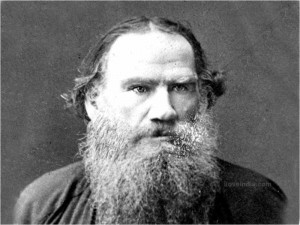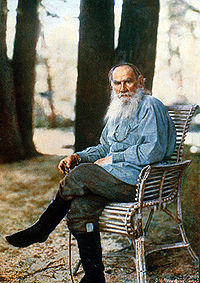 The Kingdom of God is Within You by Leo Tolstoy, was written in 1894 and published in Germany, where liberal theology or “Higher Criticism” had already taken a foothold. Since Tolstoy used much of this book to lambaste the Russian government, I’m sure the Germans were all too happy to help the manuscript discover the light of day.
The Kingdom of God is Within You by Leo Tolstoy, was written in 1894 and published in Germany, where liberal theology or “Higher Criticism” had already taken a foothold. Since Tolstoy used much of this book to lambaste the Russian government, I’m sure the Germans were all too happy to help the manuscript discover the light of day.
Tolstoy seems to very anti-institutional in his overall worldview. In this theological treatise, he rails against the Orthodox, the Catholics, the Protestants (specifically the Lutherans) and even the Salvation Army.
The main gist of his argument seems to be that religious institutions prey on the masses for their own financial gain and political power. He is rather heterodox in some of his theological views, such as denying the infallibility of the Old Testament, being skeptical of miracles, opposing the church creeds on their key points, declaring that modern science and the Bible are not compatible and even claiming that man is the son of God with the same essence of God himself, and this is what makes love for other human animals possible.
It is clear why this book has not become a household favorite of conservative Evangelicals. However, as with most people who are frustrated with religion as it is currently held, many of his rebukes of the church are well-founded.
Tolstoy’s view of Christianity is that it is the moral teachings of Jesus (found in the Sermon on the Mount) that have value to all humans. Rather than believing in the miraculous or the historical claims of the Bible, Tolstoy feels that Christianity has much to give to world in terms of loving neighbors, loving God and avoiding war and retaliation for wrongs.
Overall, if I didn’t know better, I would assume that I were reading Doug Paggit, Brian McLaren, Leonard Sweet, Rob Bell, Tony Jones, Donald Miller or some other Emergent Church author who is decrying Modernity and the Modern church. Perhaps Tolstoy was ahead of his time. Or perhaps it is true that there is nothing new under the sun.


‘The main gist of his argument seems to be that religious institutions prey on the masses for their own financial gain and political power.’… ‘ I’m sure the Germans were all too happy to help the manuscript discover the light of day.’
Whether Tolstoy intended or not to bring attention to the source of the ‘kingdom’, I read the book from this vantage point. The value of such a book is to raise further questions and to invite to introspection. Those professional book reviewers tend to miss this very important point. If the Germans were happy to use the book to their advantage, they also missed the point.
It is not the criticism of the institutions that matter but the impact this criticism makes on fellow ‘believers’ and ‘patriots’, which is little to none, when such a book is read for entertainment or as some sort of guidance for fixing the world and its institutions- religious and governmental.
The Sermon on the Mount aims to ‘fix’ the individual, not the society, as the search for the ‘kingdom of God’ is not a collective activity but a very intimate, personal one. ‘I am the way, the truth and the life’ is, the way it is quasi-universally understood in Christianity, misleading believers into idolatry of the person, making from Christ an object of idolization. I don’t think Christ intended that or would care to be hailed as another ‘important’ figure, no different than a movie star, musician, politician or athlete. It is not knowing the rules of bowing and kissing icons, of moving smartly in the church and saying the right words that most believers take for faith but the following of Christ’s teachings.
However, I find that Tolstoy misses other most important teaching of the Christ by focusing on the Sermon on the Mount only [which sounds more like a continuation of the old testament through its directions on what to do/not to do]. ‘Thou shall not’… commit adultery, for instance, which was important, especially in those times, to the social morals. To me, this aims beyond the act of animal attraction, to highlight restraint of the mind from unruly desires. Important here is to not allow the mind to control one through fear and desire. From this perspective I find Luke 12:22-34 much more relevant as guidance to the seeker of the kingdom.